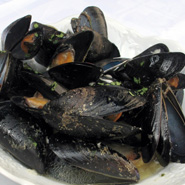|
 You may need more than salt! You may need more than salt!
Recent studies have shown that many school children are becoming deficient in iodine, an essential nutrient for growth and development.
Adults require about 150 micrograms of iodine per day (200 micrograms if pregnant or breast feeding), but many of us are not getting enough.
Iodine is essential for a healthy thyroid which produces the thyroid hormones. These hormones are vitally important in assisting with normal brain and physical development for developing babies and children.
Prolonged deficiency, particularly in children may lead to lower intelligence levels and learning disorders. In adults it can cause thyroid disease. Exposure to high levels of iodine (over 1000 micrograms per day) is also potentially harmful.
Because health authorities recommend minimising salt intake (largely to reduce the risk of high blood pressure), we should all look to eat more seafood to maintain our iodine levels.
The main source of iodine for many people is iodised salt (iodine has been added). Sea salt is a poor source of iodine.
The richest sources of natural iodine are seaweed and seafood (such as fish and mussels). Plants and animals contain varying amounts of iodine depending on the concentration of iodine in the soils in which they were grown.
Vegetables, in particular beets, celery, lettuce and mushrooms contain some iodine. It is also found in fruit (grapes and oranges) and foods including eggs, meat, and dairy products.
Supplements of iodine may be an important source for those who are vegetarians, allergic to seafood or do not eat iodised salt.
Remember: Consult your doctor if you are thinking about taking an iodine supplement.
Source: Nutrition Australia http://www.nutritionaustralia.org/Food_Facts/FAQ/summary_what_is_iodine_faq.asp
http://www.betterhealth.vic.gov.au/bhcv2/bhcarticles.nsf/pages/Iodine_explained
|